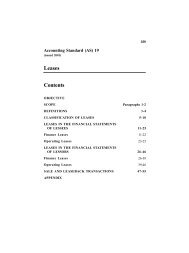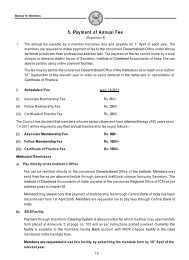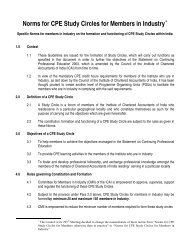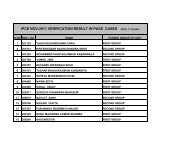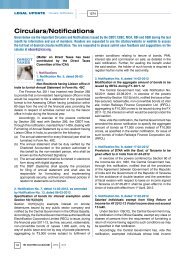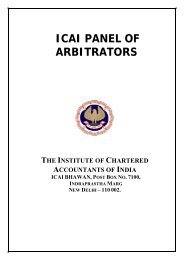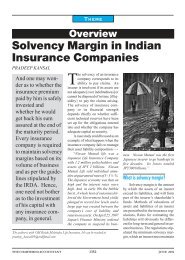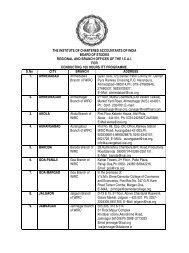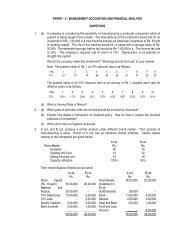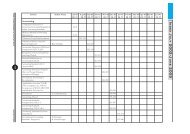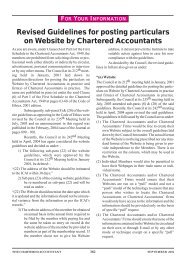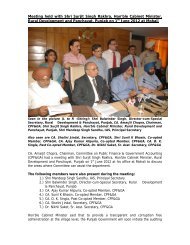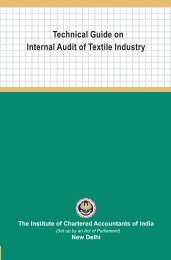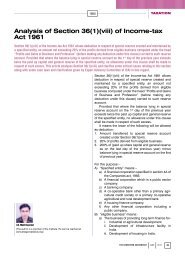The Chartered Accountant
The Chartered Accountant
The Chartered Accountant
Create successful ePaper yourself
Turn your PDF publications into a flip-book with our unique Google optimized e-Paper software.
DECEMBER 2008 1004 THE CHARTERED ACCOUNTANT<br />
LEGAL UPDATE<br />
Money Laundering<br />
Section 1 of the Prevention of Money Laundering Act, 2002 — Constitutional validity of<br />
Constitutional validity of the Act<br />
Pareena Swarup v. Union of India (Supreme Court) 30 September, 2008<br />
<strong>The</strong> Appellant filed a writ petition contending that the<br />
provisions of the Act are so provided that there may<br />
not be independent judiciary to decide the cases under<br />
the Act but the Members and the Chairperson are to<br />
be selected by the Selection Committee headed by the<br />
Revenue Secretary. <strong>The</strong> Constitutional guarantee of a<br />
free and independent judiciary and the constitutional<br />
scheme of separation of powers can be easily and seriously<br />
undermined, if the legislatures were to divest<br />
the regular Courts of their jurisdiction in all matters,<br />
entrust the same to the newly created Tribunals. <strong>The</strong><br />
Respondent placed on record that the suggested actions<br />
have been completed by amending the Rules.<br />
<strong>The</strong> Court observed that it is necessary that the Court<br />
may draw a line which the executive may not cross<br />
in their misguided desire to take over bit by bit and<br />
judicial functions and powers of the State exercised<br />
by the duly constituted Courts. While creating new<br />
avenue of judicial forums, it is the duty of the Government<br />
to see that they are not in breach of basic<br />
constitutional scheme of separation of powers and<br />
independence of the judicial function. We agree with<br />
the apprehension of the petitioner that the provisions<br />
of Prevention of the Money Laundering Act are so<br />
provided that there may not be independent judiciary<br />
to decide the cases under the Act but the Members<br />
and the Chairperson to be selected by the Selection<br />
Committee headed by Revenue Secretary. Further, as<br />
the amended/proposed provisions are in tune with the<br />
scheme of the Constitution as well as the principles<br />
laid down by this Court, the same is approved and the<br />
respondent-Union of India is directed to implement<br />
the above provisions.<br />
<strong>The</strong> writ petition was disposed of.<br />
MRTP<br />
Section 36A of the Monopolies and Restrictive Trade Practices Act, 1969 — Unfair Trade Practice<br />
Section 36A does not apply in a situation where goods are not sold at all<br />
Philips Medical Systems (Cleveland) Inc. v. Indian MRI Diagnostic and Research Limited and Another (Supreme<br />
Court), 29 September, 2008<br />
<strong>The</strong> appellant is a company based in USA engaged<br />
in the business of manufacturing and selling of various<br />
medical diagnostic equipment. Respondent No.<br />
1 wanted to purchase a Whole Body CT Scanner and<br />
held negotiations for the same with the appellant. <strong>The</strong><br />
First Offer lapsed without being accepted on the expiry<br />
of 90 days as import licence was not forwarded by<br />
respondent No. 1 within the validity period. A Second<br />
Quotation was accepted by respondent No. 1, which<br />
was duly endorsed by respondent No. 2. <strong>The</strong> Letter<br />
of Credit (L/C) had been opened for a sum quoted<br />
in the first offer instead of the agreed price through<br />
the second offer. Respondent No. 2 refused to amend<br />
the L/C and wanted the appellant to falsify the shipping<br />
documents. <strong>The</strong> L/C was never encashed by<br />
the appellant and was returned to respondent No. 1.<br />
Respondent Nos. 1 & 2 filed a complaint before the<br />
MRTP Commission. MRTP Commission allowed the<br />
complaint and has held the appellant guilty of unfair<br />
trade practice and directed to pay compensation.<br />
<strong>The</strong> Supreme Court held that Section 36A does not<br />
apply in a situation where goods are not sold at all. It<br />
only applies where goods are sold. Section 36A was<br />
really meant to protect consumers against defective<br />
goods or goods sold which do not have features or<br />
qualities which they were represented to have. Since<br />
the appellant did not sell the CT scanner at all to the<br />
respondent, Section 36A is not attracted at all.<br />
Per Altamas Kabir, J. :<br />
However, there may be situations where a promise to<br />
supply a particular good, which the supplier knew that<br />
he was in no position to supply, with a motive of promoting<br />
of some other model, as has happened in the<br />
instant case, could occur. In such a case a customer<br />
may be forced to obtain the same material from some<br />
other party and suffer losses in the process. <strong>The</strong>rfore,<br />
even without actual sale of goods, such an act on the<br />
part of the supplier could also amount to ‘unfair trade<br />
practice’ and Section 36-A cannot in absolute terms<br />
be said not to apply to a situation where goods may<br />
not have been sold at all. In fact, such a situation may<br />
also be covered even by the provisions of Sub-clause<br />
(ii) or (vi) of sub-section (1) of Section 36-A.<br />
<strong>The</strong> appeal was allowed.



